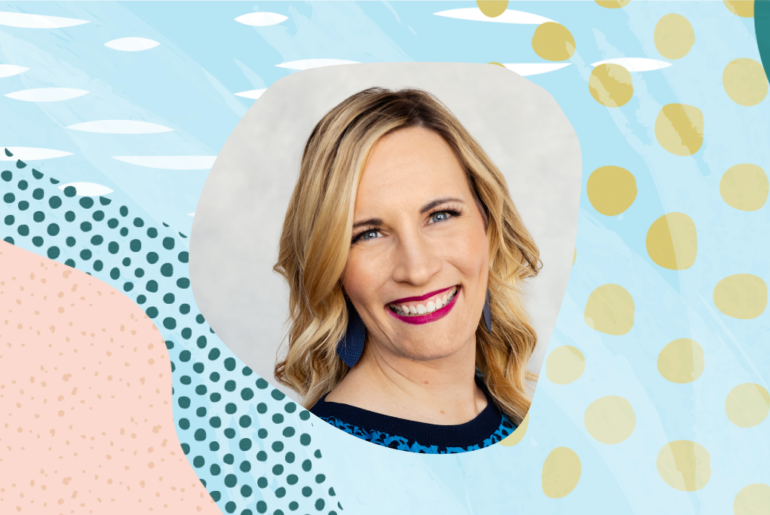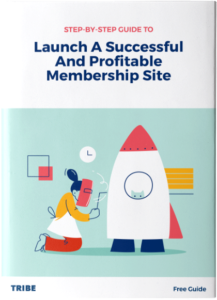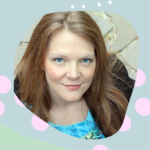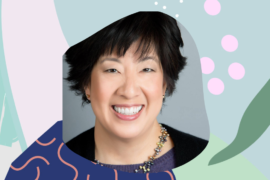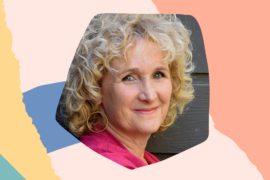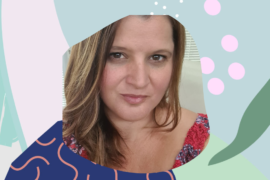After seeing her mother file for bankruptcy, Kelsa Dickey believed that becoming a financial advisor was her dream job. However, she discovered that she didn’t want to help people with investments, insurance, or long-term planning. Instead, she wanted to help her clients’ make sense of the money each and every day.
Now, at Fiscal Fitness, she provides financial coaching with a specific focus on the day-to-day part of money. She spends her working days following her passion, and helping people plan for and create the lives they want to live. Through her membership, Financial Coach Academy, she teaches financial coaches everything they need to know to do what she does.
Today, Kelsa joins the podcast to tell the story of how she found her passion, invented her niche, and let go of the limiting beliefs that were holding her back from succeeding on her terms.
Key Takeaways
- How listening to her coworkers complain about their financial problems inspired Kelsa’s business.
- Why Kelsa said she’d never train another person to do her job – and why things changed after she had her daughter.
- How Kelsa took the leap into entrepreneurship to pursue what she truly loved.
- The self-sabotaging belief Kelsa had to overcome to help her business soar – and why almost everybody has one.
Free Give
FREE Guide – Launch & Grow a Profitable Membership Site
Ready to reclaim your time and attract more monthly paying customers? Our step-by-step guide will show you how to build a membership site that turns your passion into recurring profit. Click here to download!
Memorable Quote
- “It’s not about whether or not you have money blocks, it’s a matter of what they are.” – Kelsa Dickey
Episode Resources
Transcript
Read The Transcript
[INTERVIEW]
Shelli Varela: Kelsa Dickey, welcome to the It’s a TRIBE Thing Podcast. How are you?
Kelsa Dickey: I’m great. How are you?
Shelli Varela: I am outstanding. I loved our pre-chat and so much for you to teach and share about your journey, your expertise, and all of the juicy nuggets. Would you start with who you are and who you serve?
Kelsa Dickey: Yeah. So, I am Kelsa Dickey. The name of my business is Fiscal Fitness Phoenix and I am a financial coach. So, I really focused on helping people gain control of their day-to-day spending and I also help other financial coaches know how to do that successfully for themselves as well.
Shelli Varela: Amazing. How did you become this incredible person who is not only knowledgeable in the nuts and bolts of finance but in the mindset of how people feel and act around money?
Kelsa Dickey: Yeah. It’s been a long journey and it actually started back when I was in middle school. I remember glancing over at the dining room table and seeing my mom with a pad of paper, a stack of unopened mail, a calculator, pen and paper, and her head hung in shame as she really tried to figure out like where is her money going and that kind of thing. And I remember the day she came home and she was crying and she said, “I filed for bankruptcy.” And I was a middle schooler at the time so, of course, I didn’t know what bankruptcy was and I didn’t know the ins and outs of that. I just knew that it had to do with money and I knew that it wasn’t good. And I knew that my mom had a lot of stress around money and she had a great job. She worked really hard. She tried so hard to be good at it. She just didn’t know how to play the game. And so, I said at that time that I wanted to help people with their money. And a college recruiter came to my high school and said, “You should become a financial advisor,” and I said, “Okay.” So, I got a degree in finance and I went into financial advising for a few years, thinking it was going to be this dream job, this passion of mine, that I was going to live my life, fulfilling my passion of helping people with money only to realize that it was not the passion that I really had, which was I didn’t want to be helping people with sort of investments or insurance or the long-term planning.
My mom actually had that part figured out. The part she struggled with was the money in her checking account that day. How do you know if you can spend it or save it? And I was not helping people with that part of it as a financial advisor. So, I had a quarter-life crisis. I was still really young. I went into corporate finance because I told myself that a job is just a job. You don’t have to love it. You just got to be good at it and have it pay the bills and that kind of thing. So, went into corporate finance. And just at the water cooler, I would be standing and talking with coworkers and they’d be complaining about money or talking about debt or they got into a fight with their spouse that morning about their car payment and that kind of thing. And I just started to say like, “Hey, come over after work and I’ll see if I can help you.” And that’s really where Fiscal Fitness started. And after doing it for a little while as a hobby, just helping people at my dining room table, I launched Fiscal Fitness 12 years ago, which is a financial coaching company where I specifically focus on the day-to-day part of money. I’ve got a team of coaches that help people. And I used to say that I would never hire or train another financial coach in my life. So, those words came out of my mouth all the time, when I first started my business.
I used to think there was no way that I could possibly train another human being to do what I do, which I do think is sort of this balance between the really analytical side of money, the calculations, and knowing the technical knowledge and the mindset part, an emotional part of money. Then five years ago, my daughter, Carmen, was born and I had this epiphany that I had been quite naive up until then, which was this idea that I could help everybody that my mission to take the stress out of money in our world that I could somehow do that all by myself that one client at a time, I would eventually reach my goal. And I realized after having my daughter that that was not going to be possible. So, I decided the best way to do that was to continue coaching clients while at the same time teaching other coaches how to be really great financial coaches themselves and get great results with their clients and combine both the analytical and the emotional part of money. And I launched the Financial Coach Academy course, which is like an executive MBA program, if you will, for financial coaches, teaches them everything they need to know.
After doing that for five years, every year we would have another cohort of coaches come through it and every time as great as it was and as much as I love the academy, it would end and it was always a little heartbreaking and felt like I was letting them go and here I was sending them their way and I just hope that I had done enough for them. I hope that I had taught them enough and given them enough skills that they could truly do it on their own and I just never knew if I could. And that’s where I decided I needed some support options or a program after the course was over to continue supporting those coaches in their endeavors. And so, that’s where I decided to launch a membership. That would be after the academy course itself but had no idea how to do that, didn’t know anything about memberships, or anything like that, and that’s when I found TRIBE, and sort of went down the path of designing that.
Shelli Varela: That’s quite a story. I’m interested to know you were talking about, you went into corporate sales, and I thought it was pretty impactful what you said. You thought you didn’t have to like a job. You didn’t have to be passionate about it. A job was just a job. It was a means to earn money. But then you segued into talking about chatting with people around the watercooler and then inviting them to your home to see if you could help them. What did it feel like? And at what point did you know that there was something in that? What was it in that piece where you’re bringing these people to your home? And what did that transformation feel like for you internally?
Kelsa Dickey: Yeah. I used to tell people just as a joke that like I did budgeting as a hobby and people would look at me really strange, and I’d be like, “No, I really love budgeting, like I love paying bills and getting out of debt.” Like it was just something that was always something that was really fun for me. It was like figuring out a puzzle but I never thought you could do that as a living. There were no financial coaches 12 years ago when I first launched my business. It really wasn’t something that people made a living doing so I just thought it would forever never be a hobby. Well, what happened was I would just start helping one person at a time and then another person and then another person. One day I was driving home from work, again, corporate accounting, lots of deadlines, lots of high-pressure decisions, and I was exhausted. I probably worked 12 hours that day. I had this feeling like I had just given that my all and I’m going to show up tomorrow and there’s going to be a whole stack of papers on my desk still to tackle and I just felt exhausted and burnt out. I got home and that night I had a client coming over. We would probably meet for an hour at that time.
And so, it was one of those things where I would meet sometimes after work, after I get off work. And the client, I helped them for an hour. They left. And I remember this day just feeling invigorated and energized and like there was this pivot that happened during that one hour that it took me from feeling exhausted and burnt out and like I had nothing left to give and it had completely filled my cup. It was just one of those things where it was like I remember saying to my husband that night, I said, “I think this is what I was meant to do.” Like it was just such a simple idea, though, at the time and I remember saying to him, “I think I have to try this.” We spent about a year planning at that time like, well, what would this business look like? Because at that time, it truly was a hobby. People would pay me a little bit here and there but I didn’t have a lot of set price structures or anything like that. And I remember just thinking like what would my business name be like? Would I call myself a financial coach? Is that the right title? Like it was just this idea and I told him, I said, “I don’t know if I can do this but I feel like I will regret not trying.”
And that feeling of regret of not trying is greater than fearing failure at it. So, I told him, “Let’s give it a year.” We’re financial people so we gave us a little runway and we said, “We’ll give it a year,” and I remember, I like to tell coaches this because I remember we had Plan B and Plan C figured out. In other words, when I started my business, we sort of expected me to fail at it. Does that make sense? Like I really thought if I fail, here’s what we’ll do or when I fail don’t worry, we’ll do this and then I’ll do this and it’ll be okay. And it’s fascinating to me because, at the time, my goals for my business were like I just wanted to make $2,000 a month in my business or something like that. I thought that would be amazing and it was just a simple desire. I just wanted to be helping people and making money helping people. I just wanted to make a living doing something that I loved but told myself I could possibly fail at it but that I would not regret giving it a shot but I would regret not giving it a shot.
Shelli Varela: I love what you were talking about in terms of it filling your cup. What I hear often and I almost feel like it’s a similar vibe with what you are saying is there will be something that comes so naturally to somebody. And they think, “Well, that can’t be it.” Was there a piece of you that just thought, “Well, it can’t be this easy. It can’t be this natural for me. Is this actually the thing?”
Kelsa Dickey: Yeah, because nobody was doing it so there was this idea of like, “Is no one doing it because they all know something that I don’t know?” Like they all have life figured out more than I do. And by me trying this like I’m the dumb one like I’m the one that’s like thinking I’m going to take this risk and everyone else knows something that I don’t know. And yet it also felt like at that point, there was no other option for me at that point. I remember thinking that. It felt like everything was pointing towards this was what I was going to try. I was going to leave my corporate job. I was the breadwinner at the time, actually. So, that was also a scary thing was to sort of leave this secure position in corporate finance and become an entrepreneur. I don’t come from a family of entrepreneurs. This is not something like I’m brought up in that world. So, there was a lot of growing pains. I remember people were like, family would be like, “You’re going to do what? No, just go part-time, though, for a little while first. Don’t leave your good job.” Because I come from a family where like they work someplace for 35 years and then retire from the same place. So, like you didn’t do what I was doing. And it felt risky and yet it felt simple in the sense that it was filling my cup and I really didn’t feel like I had a choice. Like it felt just like what I had to do.
Shelli Varela: I think it’s fascinating, especially when you talk about the beginning of your story, all the jigsaw pieces that have come together from different seemingly unrelated places. You talked about watching your mom and you describe that in detail. You described her hunched over and trying to manage her checkbook. And especially I’m sure as a young girl, that had to leave an incredible mark or impact on you. And for those people who are listening, there are times when there are things in our lives that are seemingly unrelated but then when you put them together, you get something truly magical. And so, what I loved about what you were talking about in terms of your journey, what you do, and what you offer, is you absolutely have earned the right clearly to talk about finances but what a gift it is to be able to have the emotional quotient to be able to understand what that feels like. How much do you think money and mindset, and this is both a teaching point for our listeners but also for those entrepreneurs out there who are working on their money mindset. What would you offer them in terms of our ability to stand in our own way with respect to money, earning money and wealth?
Kelsa Dickey: Oh, gosh. You know, everything is on a spectrum. So, I like to say that some people have some pretty severe money blocks that are really holding them back and sort of creating some self-sabotaging actions or inaction, and other people have some really subtle ones and they are quick to identify them. They’re easy to work through that kind of thing. What I like people to know is it is not a matter of if you have them. It is a matter of what are they. So, all of us have money blocks, myself included. So, I always tell the story about people think, “Well, you’re a financial coach. You don’t have money blocks,” and it’s like, “No, we all have them. And they will come up at different times of your life depending on your experiences.” So, one money block that I had was after my daughter was born. So, I had already been a financial coach for at this time, it had been 10 years. She was a few years older and my money block, the way I was self-sabotaging, I kept hitting the ceiling in my business for income. It was like no matter what I did, I just could not hit the certain number. I would get really close to it. And then the end of the month would hit and I would miss it by $100 or something.
And I just kept thinking, “What is happening?” Well, my money block was that if I make too much money, my daughter will grow up spoiled and entitled. So, I was purposely sort of like keeping extra money at arm’s length or like waiting for it to come in the following month so that I didn’t make more money. And the odd thing was that the money that I was making, the ceiling was the same amount that I remember my dad bragging about that he was making. Does that make sense? So, this is all subconscious, right? Like it’s not like I was aware of it at the time. So, I kind of had to reflect on that like what does create values in a child? Why does a child grow up spoiled and entitled? What causes that? And really the work that my husband and I did was identify what are the values that we want her to grow up having? What is important to us to teach her? And then what we did was we actually wrote out what we call the Dickey family creed, which is the list of values that we will choose to live our life by, to run our business by, to grow our family by, all of those things. And what we decided is that it does not matter how much money we have. These are the values we are going to live our life by and what we will teach our daughter to live her life by.
After that, it was just this thing where it’s not connected to money. So, once I was able to disconnect the two things that we can become wealthy and my daughter can grow up a very humble, kind human being at the same time, my business soared.
Shelli Varela: It’s so powerful.
Kelsa Dickey: It’s amazing to me how people assume if it’s not a super deep, intense money block that they don’t have them. It’s not a matter of if you have them. It’s just a matter of like how severe is it.
Shelli Varela: That’s a great example and I know that there will be a lot of people. I’ve heard that specific example about people having a number that they just can’t seem to break that ceiling so that’s really helpful. With respect to your membership site, last question, what do you believe that has made possible in your life that wasn’t possible before you had the membership?
Kelsa Dickey: Yeah. There is some direct results and then indirect. And the indirect ones are ones that I just did not expect at all. So, the direct that I feel is if I am truly supporting the coaches who have trusted me for since the beginning. So, when they first initially invest in the academy course, which serves as the core content, it was like death by 1,000 papercuts where it was like every person who went through it, I felt like once they graduated from the course, and I mean, we have glowing reviews. I mean, it’s amazing to me what the reviews are that we have on the course. So, I know people were loving it and yet I felt like I was still letting them down. It was eating away at me slowly and surely and I just felt like it was a missing piece in my business. So, when I launched the mastermind, it shifted my whole energy into feeling I was actually able to sell the course content even more because I offered the mastermind now on the backend, and I didn’t doubt whether or not I was somehow letting them down without them even realizing it. Does that make sense?
Shelli Varela: That totally makes sense. And really, I’m getting a lot out of this because even that, it’s like what are the subtle stories that we’re telling ourselves, whether it be the ceiling about how much we’re able to make or whether it be clearly you’re a person who has a lot of integrity, and just that small, subtle, unconscious, holding back of I don’t want to leave people hanging. And just the shift of, well, now I can support them in the way that I know that I want to and they deserve to be supported. And then your core sale goes up as well.
Kelsa Dickey: Yeah. That’s exactly it and so the other results are that the mastermind now in the membership fuels my creativity in a way that I had been lacking because of the misplaced energy. So, now, the questions I get serve multiple purposes and we turn it into great marketing. We turn it into videos and better content for the course and we can give better examples. And just like you guys do, we take those stories from those coaches and take their success and use it to inspire brand new coaches who are right where I was in questioning, “Is this even possible? Can you even make a living being a financial coach?” And now I can show all of these really great examples of, “Well, here’s this one coach making X amount per month as a financial coach. Here’s another person getting these types of results with their clients. Here’s another coach,” and taking all of those and showing them to brand new coaches and I really feel like the ripple effect of that. So, as a financial coach myself, I can maybe have 50 clients at a time that I’m helping. As a financial coach trainer and mentor, I can help 50 financial coaches who then help 50 clients each better manage their money. I feel like the impact that I’m truly having is ultimately what I set out to achieve. The how has changed over the last 12 years but I really feel like I’m actually fulfilling my passion now because of my mastermind and because of my membership.
Shelli Varela: It’s so powerful. And the direct result of that is somewhere somebody’s mom sitting around a table is able to balance her budget and not have to say that to her daughter.
Kelsa Dickey: That’s exactly right. Yeah, that’s exactly it.
Shelli Varela: I so appreciate what you’re doing out there. If people are looking to connect with you online, where’s the best place they can find you?
Kelsa Dickey: So, if you are a business owner, client, individual, and you’re just looking for help with money, check out Fiscal Fitness Phoenix. We help people all over the country. So, even though I’m based in Phoenix, we can help you. If you are considering becoming a financial coach, we are at FinancialCoachAcademy.com.
Shelli Varela: Amazing. Thank you so much, Kelsa. We appreciate your time and that ripple effect.
Kelsa Dickey: Thank you so much.
[END]
To learn more and get access to all episodes, visit our podcast page!
